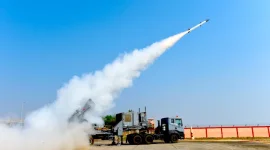- Views: 862
- Replies: 1

Pakistan's long-held practice of naming its ballistic missiles after historical Afghan invaders, intended as a symbolic taunt to India, has unexpectedly backfired amidst a burgeoning geopolitical dispute with Afghanistan.
The controversy erupted when Pakistan's Defence Minister, Khawaja Muhammad Asif, in a surprising turn of events, labelled Mahmud of Ghazni "merely a plunderer" during a televised interview.
This statement has ignited a firestorm in Pakistan, where Ghazni is often glorified in educational curricula for his 1026 raid on the Somnath temple in India.
Historically, figures like Mahmud of Ghazni, Ahmad Shah Abdali, and Muhammad Ghori have been lauded in Pakistan for their roles in historical conflicts against Indian forces.
Abdali is celebrated for his victory in the third battle of Panipat against the Marathas, while Ghori is remembered for his defeat of the Indian king Prithviraj Chauhan.
These names – Ghaznavi, Abdali, and Ghauri – are prominently featured in Pakistan's missile arsenal, including the Ghaznavi (Hatf-III), Abdali-I (Hatf-II), and Ghauri (Hatf-V), respectively. This naming convention was not merely about showcasing military might but also served as a cultural and historical assertion against India.
This strategy had multiple objectives:
- Provocation: By invoking the names of invaders who clashed with Indian forces, Pakistan aimed to provoke a reaction from India, keeping the historical rivalry alive and maintaining tension.
- National Narrative Building: These names were instrumental in constructing a national identity narrative that glorifies Islamic conquests, lending historical legitimacy to Pakistan's claim of being the true representative of Islam in the subcontinent.
- Strategic Messaging: The missile names served as a constant reminder to India of Pakistan's nuclear capabilities, symbolically suggesting that historical victories could be replicated in modern conflicts.
Furthermore, this incident has not only caused embarrassment for Pakistan on the international stage but has also strained its relationship with Afghanistan. Kabul has previously objected to Pakistan's practice of naming missiles after Afghan heroes, viewing it as an appropriation of their history for military posturing. The Afghan government and public believe this practice diminishes the complex roles these figures played in their own history, reducing them to mere tools of modern geopolitical strategy.
This controversy underscores the complexities of history and its use in contemporary politics. Pakistan's attempt to use historical figures to assert dominance over India has backfired, exposing internal contradictions and straining its relationship with Afghanistan. It remains to be seen how Pakistan will navigate this delicate situation and whether it will reconsider its missile-naming strategy in the future.




